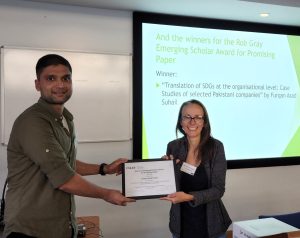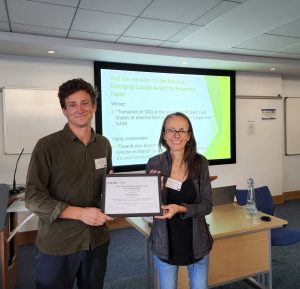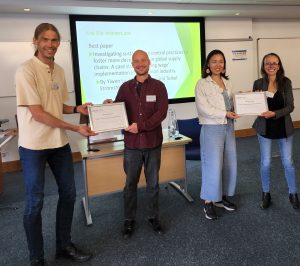Colin Dey
In August 2022, the University of St Andrews once again played host to the CSEAR International Congress and Emerging Scholars Colloquium. Both events were a great success, and our thanks go to the respective organising committees for doing such a superb job. This blog focuses on one of the many highlights of these events – the awards given by both the Congress and the Colloquium for best papers.
Starting with the Rob Gray Emerging Scholar Award for Promising Paper, this is given to the Colloquium paper that in the view of the judging team, demonstrates the highest levels of risk taking/innovation, social/sustainable significance and potential contribution to the sustainability accounting literature. This year’s winner is Furqan Asad Suhail of Sheffield University Management School, for his paper, “Translation of SDGs at the Organisational Level: Case Studies of Selected Pakistani Companies”.

Furqan Asad Suhail receiving his award from Michelle Rodrigue (image courtesy of Charles Cho)
Upon receiving his award, Furqan said, “The United Nations Sustainable Development Goals (SDGs) are drafted for national governments, but private sector organizations are not only claiming to translate the global goals but also reporting on them. This requires investigation and understanding; what is happening within the organization in the process of SDGs translation? To address this pressing question, I am working on a PhD project which aims to explore and understand the translation of the SDGs within three leading private sector companies in Pakistan: one multinational company and two local companies.
“I am about to start the fourth and final year of my PhD. I returned to the UK in June after four months of data collection/fieldwork in Pakistan, and CSEAR provided me with an excellent opportunity to present the finding of the ongoing PhD project, ‘‘Translation of the SDGs at the organizational level: Case studies of selected Pakistani companies’’ at 9th Emerging Scholars Colloquium – in August 2022. It was the first conference I attended in-person, and it was a great memorable experience for several reasons.
“Firstly, I met the lovely CSEAR community in person, which was truly a humbling experience. Everyone at the conference was approachable and welcoming – either during the conference or at socials. And it was fantastic to learn about the ongoing work of the other emerging scholars and senior academics. Secondly, I received valuable feedback from the leading academics and the lovely CSEAR community. I would like to especially thank Carlos Larrinaga and Jesse Dillard – who were the session faculty – for their valuable feedback, and Jan Bebbington for her time to discuss the project and offer her feedback during the side-events. In addition, I want to thank Ataur Belal – my supervisor – who has always been there for me since the start of the project.
“The feedback and suggestions I received during the conference are helping me to solidify and refine the project. And the conference gave me confidence – especially when I was awarded Rob Gray Emerging Scholar Award for Promising Paper. I look forward to learning and being part of the CSEAR community. I can’t wait to attend the 33rd International Congress on Social and Environmental Accounting Research in 2023.”

Clement Boyer receiving his award from Michelle Rodrigue (image courtesy of Charles Cho)
Highly commended in the same category was Clement Boyer of Paris Dauphine University / AgroParisTech, for his paper “Towards New Accounts of the Soil: Practical Application of a Genuine Ecological Accounting from the Organisation to the Socio-ecosystem”. Clement is currently enrolled as a second year PhD student at the Ecological Accounting Chair (Paris Dauphine University and AgroParisTech) and his research project aims to develop ecological accounting models to support the agroecological transition at both farm and territorial level.
Receiving his award, Clement said, “The 32nd CSEAR congress was my first and I’m glad I could meet up with this vibrant and inspiring community! It was a unique opportunity to share and discuss my research project during the Emerging Scholar Colloquium and get feedbacks from faculty members as well as other PhD students from such diverse backgrounds. I’m humbled to have received the ESC second best paper award, encouraging me to move forward and sparking exciting and fruitful discussions with several CSEAR scholars! The paper I presented at the ESC outlines the main objectives and (expected) contributions of my research project.
“My research focuses on an emerging ecological concern for soil preservation through the prospect of its integration in integrated accounting systems. Grounded in the Anthropocene interdisciplinary discussions this inquiry builds on relational ontologies and critical interventionist research methodologies to study soil care practices from the farm to the territory in order to design new accounts of soil capital and foster change by implementing integrated tools (ecological indicators, dashboards, BP, P&L and BS). In this context, I see ecological accounting as a tool to progress towards sustainable business models as well as ecosystem collective management but also as a way to articulate scales and to account for conflicting knowledge politics and perform diverse economies for soil care.”

Marek Reuter and Yiwen Lu receive their award from Matias Laine and Michelle Rodrigue (image courtesy of Charles Cho)
Finally, we come to the winner of this year’s Best Paper Award at the CSEAR International Congress. This award places emphasis on a wider range of criteria, including rigour, novelty, clarity, relevance, and potential. The winners are Yiwen Lu, Marek Reuter and Torkel Strömsten of the Stockholm School of Economics for their paper, “Investigating sustainability control practices to foster more decent wages in global supply chains: A case study on ‘living wage’ implementation in the fashion industry.
Upon receiving the award alongside Yiwen Lu, Marek said, “The CSEAR UK Congress was my first conference after the long covid break. It was a truly fun and interesting event, fully packed with presentations and talks. No doubt, many inspiring ideas about social and environmental accounting research were born and exchanged this fall in St. Andrews. One could probably fill some pages on that. But rather than focusing on the research side of things, I’d like to briefly share another – equally important – characteristic that I find to make this conference really stand out. It is, in fact, that it does not only feels like an academic conference, but also like a meeting of family and friends.
“The last time I visited the St. Andrews campus I was still a PhD student. Walking towards the round building some thoughts popped up. ‘Will folks remember me?’ ‘How should I greet everyone?’ ‘Is my research worth being here?’ These and some alike questions were quickly forgotten when I was welcomed with many lovely and genuine smiles and hugs. It was these little, but so very meaningful gestures, that quickly set the scene for me: There really is no need to worry, all I need to do is to fully embrace and take in these next three days; this is a community that truly means well, cares, and supports. It was almost like a déjà-vu – five minutes after I entered the CSEAR conference I had the same thoughts and feelings that I had when I left it three years ago.
“The session to remember, honour and say farewell to Conny Beck, Rob Gray, and Jeffrey Unerman was deeply touching. I, unfortunately, did not really get to know these scholars personally, except from their articles which deeply inspired me and my research. But still, it was easy for me to identify with the words shared by those who had the privilege to become close colleagues and friends with them. One thing that stood out for me in the short speeches shared by some at this session was that – as Iain Thompson put it – ‘Conny’s, Rob’s and Jeffrey’s ideas live on with us’. And while it was always clear for me that this is the case in terms of research – be it in our papers, presentations or discussions; it was during that session that I really understood what this also means. As such, some of the (now) more established CSEAR members shared how meaningful and important it was for them to be so openly and warmly welcomed by their very role models that they only knew from papers at the time. How they were effortlessly made to feel important part of the CSEAR project, as opposed to foreign and insignificant young scholar. Or how they quickly came to understand – and accept – that insecurities and vulnerabilities are perfectly normal and fine in this business, as the ‘old ones’ casually shared their own with them.
“I now understand, that the ‘ideas’ Ian Thomson referred to are not ‘merely’ ideas about research. They are as much ideas about community, about caring for and supporting each other. About being part of a big ‘family’ that only together can accomplish the big and important endeavours that underly CSEAR. I want to take the opportunity here to say ‘thank you’ to all the more established members for keeping these ‘ideas’ alive. You are certainly doing a good job at it!
“I also want to again say thank you to all the organisers that make this event possible with their work, be it on the back- or front-stage. And a special thanks again to those who read all the submitted papers throughout their summer for the ‘Best paper’ awards. I still feel humbled and honoured to have received this recognition from CSEAR. It is truly inspiring and motivating for me.
“The paper constitutes an attempt at ‘Investigating sustainability control practices to foster more decent wages in global supply chains’. It addresses how control practices under the ‘living wage‘ discourse can reframe the question of what constitutes ‘ethical’ or ‘legitimate’ wage decision-making at the site of supplier firms. More specifically, our findings illustrate how wage related supplier controls developed from a purely calculative, monetary focus towards also accommodating (and indeed partly substituting monetary wage increases by) non-monetary and qualitative considerations to enhance workers’ living standards. We discuss how this shift from calculation to calculation, while being found a ‘practicable’ means by actors to enhance workers’ living standards, can also be interpreted as an accommodation of emancipatory living wage ideals in ways that preserve predominant neo-liberal and capitalist premises.”
